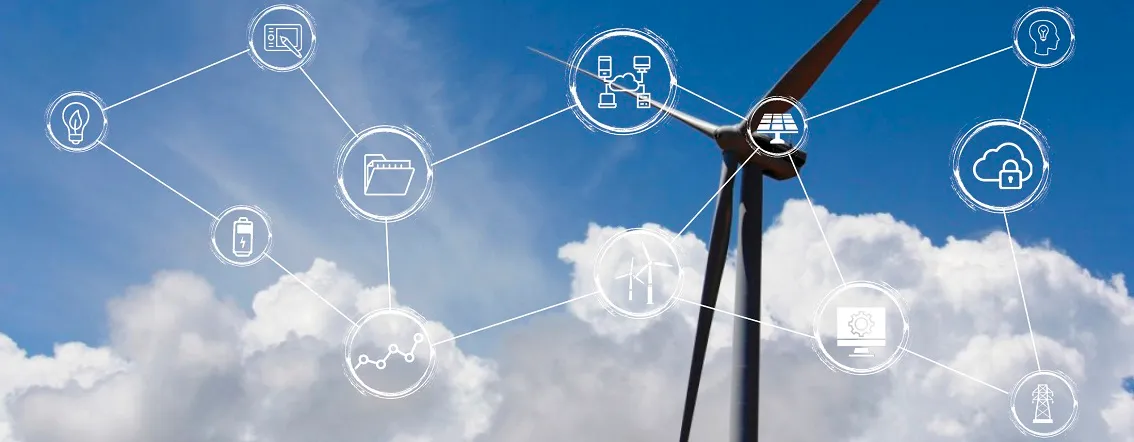New DNV GL report reviews progress, potential and barriers for digitalization in the wind energy industry. Improving operational efficiency (identified by 52% of respondents), decision making (42%) and cost efficiency (40%) are top priorities for further digitalization. Balance between sharing data and protecting competitive advantage and Intellectual Property key to realizing full potential of digital technology in the industry.
ARNHEM, The Netherlands 25th September 2019 – Digitalization is already playing a major role in the growth of wind energy, but it can still drive further improvements in operational efficiency, decision making and cost efficiency – if it can overcome concerns around data sharing. This is the key finding of the report ‘Digitalization and the Future of the Wind Energy Industry’ published today by DNV GL. Based on a survey of almost 2000 engineers and senior executives from across the energy sector, the report assesses the current progress of digitalization and identifies the top priorities for and barriers to further growth.
The wind industry is widely expected to become an ever-greater contributor to the world’s future energy mix. DNV GL’s Energy Transition Outlook report forecasts a 15-fold escalation in wind-powered generation from 1.1 PWh in 2018 to 17 PWh in 2050. In terms of installed electricity generation capacity, the amount of wind energy will increase more than 8 times by 2050 to 5TW globally.
Digital technologies have been one of the key reasons behind wind power’s growth to date. DNV GL’s report ‘Digitalization and the Future of the Wind Energy Industry’ reveals that digitalization will also be vital in achieving the wind energy industry’s ambitious future growth targets.
In particular, the industry considers improving operational efficiency (identified by 52% of respondents), decision making (42%) and cost efficiency (40%) as the top priorities for further digitalization.
However, the report also highlights that the benefits of digitalization could be threatened by issues over sharing data and limited willingness to provide more transparency. Such doubts are particularly felt in the offshore sector where concerns over data sharing (37% of respondents) and inability to access data (25%) were cited as the biggest barriers to further digitalization. Interestingly, barriers related to data were a greater concern in the wind industry than in other parts of the energy sector. Other potential barriers identified include digital skills gaps within the industry and organizations focusing on other priorities.
“The wind industry already uses vast amounts of data to improve performance, for example exploiting wind farm SCADA data to enable a predictive approach by anticipating faults and planning maintenance in order to ensure greater up-time,” said Lucy Craig, Vice President of Technology and Innovation at DNV GL – Energy. “However, this increased reliance on data brings new challenges and the wind industry faces conflicting priorities when it comes to data sharing. While the benefits to sharing are clear, there is also an essential requirement to protect competitive advantage and intellectual property. Finding the balance will allow the wind industry to unlock a bright digital future.”
The full ‘Digitalization and the Future of the Wind Energy Industry’ report is available to download here.
About DNV GL
DNV GL is a global quality assurance and risk management company. Driven by our purpose of safeguarding life, property and the environment, we enable our customers to advance the safety and sustainability of their business. We provide classification, technical assurance, software and independent expert advisory services to the maritime, oil & gas, power and renewables industries. We also provide certification and supply chain services to customers across a wide range of industries. Operating in more than 100 countries, our experts are dedicated to helping customers make the world safer, smarter and greener.
DNV GL in the power and renewables industry
DNV GL delivers world-renowned testing and advisory services to the energy value chain including renewables and energy management. Our expertise spans onshore and offshore wind power, solar, conventional generation, transmission and distribution, smart grids, and sustainable energy use, as well as energy markets and regulations. Our experts support customers around the globe in delivering a safe, reliable, efficient, and sustainable energy supply.
Learn more at www.dnvgl.com/power-renewables.
